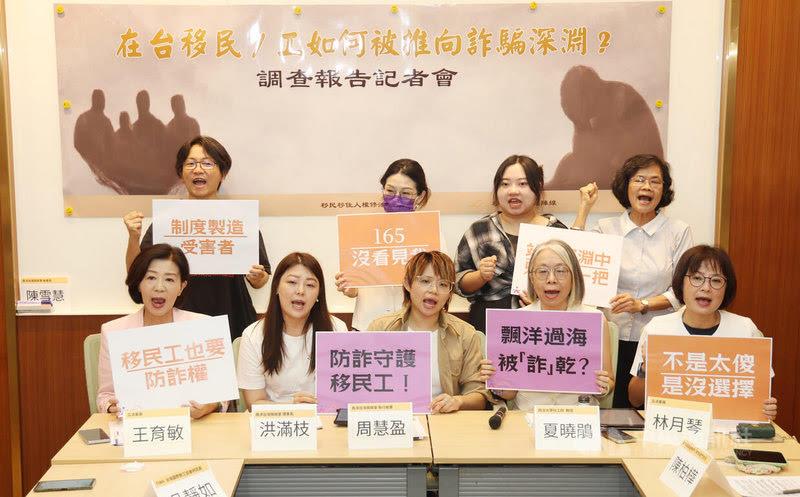The National Police Agency’s anti-fraud campaigns and policies have failed to adequately protect migrant workers and spouses, who are shown to be at high risk, the TransAsia Sisters Association (TSAT) and other civic groups told a news conference today.
The groups called on the government to release multilingual information and communication channels, with a reporting mechanism that is accessible for migrant workers and new arrivals.
The number of migrants in Taiwan reached 1.45 million as of June, with 840,000 migrant workers and 610,000 migrant spouses, the association said.

Photo: CNA
This morning’s conference, jointly held with the Immigration and Resettlement Human Rights Amendment Alliance and the Taiwan Immigration Youth Alliance, presented a report on a study of institutional issues of migrant workers falling prey to scams.
Chinese Nationalist Party (KMT) Legislator Alicia Wang (王育敏) and Democratic Progressive Party Legislator Lin Yueh-chin (林月琴) were also in attendance.
The government promotes anti-fraud campaigns for “all of society,” but it too often overlooks groups that need the most protection, such as migrant workers and migrant spouses, TSAT director Hung Man-chi (洪滿技) said.
This includes anti-fraud guidelines, support hotlines and reporting systems, leaving victims with nowhere to turn to, she said.
Taiwan has 165 anti-fraud hotlines, although they are available only in Chinese and are not accessible to non-native speakers, Wang said.
The study found that migrants often fall victim to “everyday scams” in areas such as shopping or dating, and “systemic fraud,” TSAT chairperson Chou Hui-ying (周慧盈) said.
This reflects loopholes in policy that leaves migrant workers open to long-term risk, even leaving some undocumented or missing, Chou said.
Almost 30 percent of respondents reported being scammed by recruiters using misleading information regarding job transfers, legal documentation or high-paying job opportunities, she said.
Another 30 percent said they had encountered scammers impersonating government agencies or reputable companies, she added.
The study also found that those who experienced fraud were more likely to turn to friends, those from the same community or local immigrant or migrant organisations, she said.
Only a small percentage chose to file a report with the police, it found, showing that official mechanisms are rarely the first point of call for Taiwan’s migrants.

The manufacture of the remaining 28 M1A2T Abrams tanks Taiwan purchased from the US has recently been completed, and they are expected to be delivered within the next one to two months, a source said yesterday. The Ministry of National Defense is arranging cargo ships to transport the tanks to Taiwan as soon as possible, said the source, who is familiar with the matter. The estimated arrival time ranges from late this month to early next month, the source said. The 28 Abrams tanks make up the third and final batch of a total of 108 tanks, valued at about NT$40.5 billion

Two Taiwanese prosecutors were questioned by Chinese security personnel at their hotel during a trip to China’s Henan Province this month, the Mainland Affairs Council (MAC) said yesterday. The officers had personal information on the prosecutors, including “when they were assigned to their posts, their work locations and job titles,” MAC Deputy Minister and spokesman Liang Wen-chieh (梁文傑) said. On top of asking about their agencies and positions, the officers also questioned the prosecutors about the Cross-Strait Joint Crime-Fighting and Judicial Mutual Assistance Agreement, a pact that serves as the framework for Taiwan-China cooperation on combating crime and providing judicial assistance, Liang

A group from the Taiwanese Designers in Australia association yesterday represented Taiwan at the Midsumma Pride March in Melbourne. The march, held in the St. Kilda suburb, is the city’s largest LGBTQIA+ parade and the flagship event of the annual Midsumma Festival. It attracted more than 45,000 spectators who supported the 400 groups and 10,000 marchers that participated this year, the association said. Taiwanese Designers said they organized a team to march for Taiwan this year, joining politicians, government agencies, professionals and community organizations in showing support for LGBTQIA+ people and diverse communities. As the first country in Asia to legalize same-sex

MOTIVES QUESTIONED The PLA considers Xi’s policies toward Taiwan to be driven by personal considerations rather than military assessment, the Epoch Times reports Chinese President Xi Jinping’s (習近平) latest purge of the Chinese People’s Liberation Army (PLA) leadership might have been prompted by the military’s opposition to plans of invading Taiwan, the Epoch Times said. The Chinese military opposes waging war against Taiwan by a large consensus, putting it at odds with Xi’s vision, the Falun Gong-affiliated daily said in a report on Thursday, citing anonymous sources with insight into the PLA’s inner workings. The opposition is not the opinion of a few generals, but a widely shared view among the PLA cadre, the Epoch Times cited them as saying. “Chinese forces know full well that